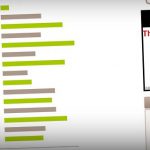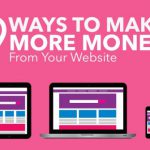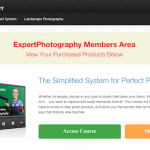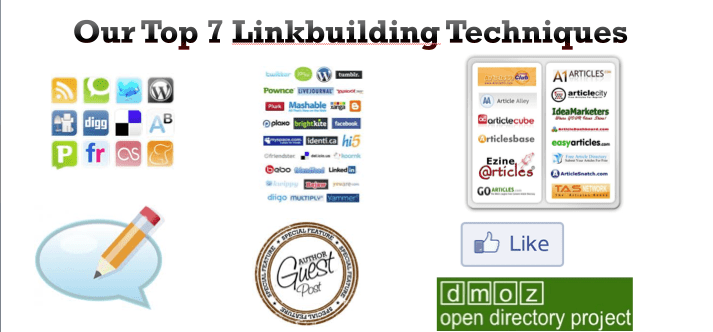
While automated webinars and webinars as a sales tool have been around for quite a while now, they are definitely a “hot” tool right now, and if you’ve been watching the internet marketing scene at all in the past 3 months, you’re probably looking to get your piece of the webinar sales action.
While creating your first webinar sales presentation might seem like a daunting task – it’s actually not that bad, and there are simple, successful formulas that you can follow to create a high converting webinar.
Basically, a successful webinar presentation is broken down into a few key components, which I will break down and explain, and provide examples from my own webinar to help you guys:
1. Introduction & Social Proof
The first thing you need to do in a webinar presentation is actually introduce who you are. Take 2-3 minutes to explain who you are, and why your attendees should listen to you. The goal here is to build rapport, get people to like & trust you. (which obviously helps you later, when it’s time to pitch!)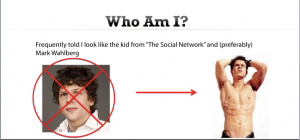
Ex: I quickly give an introduction – my name, the company or entity I am representing, and why I’m credible (the businesses that I’ve run, the people that I’ve worked with, the results I’ve gotten, etc.) I usually add in some self-deprecating humor that people tell me I look like Jesse Eisenberg or Mark Wahlberg – though I prefer Mark Wahlberg.
2. Benefits – Get Them To Stick
Now that they know that you are smart, handsome, funny, and credible, (because your intro was so killer) it’s time to explain the benefits that your attendees are going to get from watching the webinar. You can either restate whatever was on your webinar sign up page/squeeze page here, or just restate it in different words. You also want to make sure that they not only are excited for the content they are about to receive, but that they have a reason to STICK TO THE END. That is very important as if your attendees leave before you can even pitch to them, then, well, you’re screwed.
Ex: I said something along the lines of “At the end of this webinar, I will show you exactly how I can help you, and how you can get 1 on 1 help from me to get your site ranked – which is a $1,000 value – yours free, ONLY for [friends of webinar host]
This created an open loop (you’ll find out something but only if you finish this presentation) and hinted that they were going to get a ton of value if they stayed until the end (1 on 1 help for free).
3. Present The Problem & Identify an Enemy
Alright, now we get into the good stuff. This is where you really need to flex your copywriting and sales skills. You need to show them exactly what the problem is (that your product that you are eventually pitching to them will fix), and explain to them exactly what the IMPACT of that problem is – how exactly is this problem hurting them? You also, if it makes sense for your niche, want to present an enemy here – someone who you can place the blame on for causing this problem. The sad truth here is that usually it is people’s own fault for causing their own problems, however, presentations where you berate people on their faults don’t really sell well – so you need to find an enemy that you can place the blame on and tell your prospect “It’s not your fault.”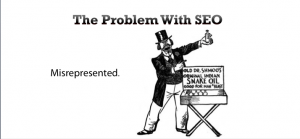
Ex. For my presentation, the problem is that SEO is overhyped and misrepresented by evil “Guru’s” (the enemy) that are just trying to make a buck. (This is totally and 100% true, by the way!) The impact of the problem is that most people end up with websites that get 10 visitors a month, and make zero dollars.
4. Empathize and Future Pacing
Here’s where you really get to build up your rapport with your attendees. This is where you explain to them that they are not the only ones who have suffered from this problem, but you have as well (only if it’s true!). In this section, you want to show them that you are just like them (or were just like them), until you found a solution (which you don’t mention yet) that has provided you with phenomenal results, that they can also achieve. You want to basically show them, through your success, and through painting a picture of their future success, what their life is going to be like with this problem SOLVED.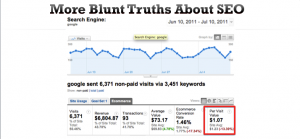
Ex. For my presentation, I talk about how when I first started, I had no idea what I was doing and my website got 0 traffic, and that I feel any struggling internet marketers pain. I then talk about how I found out the truth about SEO – that it’s easy, systematized, and outsourceable, AND profitable. I use a screenshot of one of my site’s traffic from Google – and show how each visitor that Google sends my site is worth $1.07 to me, and talk about how they can get similar results.
5. Content!
This is where you give the meat of your presentation. The real reason why your attendees signed up for your presentation was to learn whatever it is that you teased them about on the webinar sign up page – so it’s time to deliver the goods. Basically, you want this content to do a couple of things:
- Continue to demonstrate your credibility for the subject you are teaching
- Demonstrate your passion and that you’re a real, legitimate, trustworthy, awesome person
- Provide value, usually basic “What to do” content, but limiting the “How to do it” side of things. Do NOT skimp, though, if your content sucks you definitely won’t be able to sell. There’s a fine line between providing value and just providing filler content – so make sure that you are careful here.
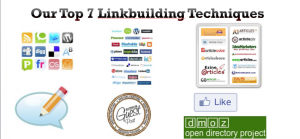
Ex. Ours was our companies “Top 7 Linkbuilding Techniques” that we’ve used on our sites and clients to get them ranked. This was complementary content as the product we were selling is about On-Site SEO, and the whole point of the presentation is that if your On-Site SEO is not setup properly, then all the stuff that we JUST taught you becomes less effective. So the solution is to buy our product and learn On-Site SEO.
6. Provide Your Solution
Now that you’ve presented your badass content, it’s time to start moving into the pitch. The solution to the problem that you had discussed before is, of course, your product. However, you don’t want to make that connection just yet – you want to present the solution as an individual entity, explain it, and then connect that entity to your product or service. At this point, you should put in a testimonial or two of someone who has used your solution and gotten great results from it.
Ex: Our solution to SEO traffic woes is On-Site SEO, and then we have three slides showing it’s value. The first slide is a screenshot of Michael’s traffic increase from our SEO tactics, the next is a testimonial from a successful customer, and the final slide is a screenshot of us outranking a well known “guru” for a competitive keyword.
7. Present Your Product + Build It’s Value
This is where you introduce the product that will provide the solution you’ve been discussing, and you show present and explain each one of the products components, their value, and how they will benefit your attendees if they purchase the product. If you have a specific bonus for your attendees (if the webinar is being hosted by an affiliate, for example), this is where you would also present it and show it’s value. At the end of this product presentation, you want to add up all the value for them (just like in the infomercials!), show them how much it SHOULD cost, and then show them how much you’re going to charge for it if they order TODAY. 
Ex: Our product had something like 10 components, so each component got it’s own slide and explanation. At the end, we had a slide with a list of all of the components, what each of their individual values were, and then what the total value of each component was. The following slide was the actual price. “You get $1,327 of real world value for just $67 if you purchase today.
8. Risk Reversal + Urgency
Whew! We’re finally at the end. The last step is showing your attendees what your guarantee is – we had a whole slide dedicated to this – and really demonstrate to them that you believe strongly in your product and you know they are going to love it, so you’re happy to provide a 30/60/90/lifetime moneyback guarantee. And if they are not satisfied with the product, they can get a refund in that timeframe with no questions asked. Once you’ve gone through the guarantee, it’s time to put up your sales link, and give some urgency for them to purchase your product right now.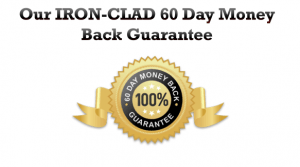
Ex: We offered a free SEO report if prospects purchased in the next 10 minutes, and had a countdown clock in the powerpoint presentation that ran in the background while the 10 minutes ticked down. During the 10 minutes, we took Q&A. However, if you don’t want to do a regular Q&A – or plan on reusing the webinar as a sales tool, my biggest suggestion here would be to have the webinar moderator ask you Q&A questions that answer your average prospects biggest objections. The biggest objections are usually whether or not they can get a refund/the validity of your guarantee, how fast they will get their results, what happens if they don’t get results, is the solution easy, etc.
And that’s it! That’s how we put together our webinar presentation and it’s worked out pretty well for us so far. One thing to note is that the first time we ran the webinar, we didn’t have a slide for our guarantee and it only converted at 11%. When we added in the guarantee slide, it doubled to 22%. Granted, I could have done a better job presenting the webinar the second time, however, I am firmly convinced that making your guarantee extremely clear to your prospects is HUGE for conversions.
Let me know if you have any questions in the comments!




